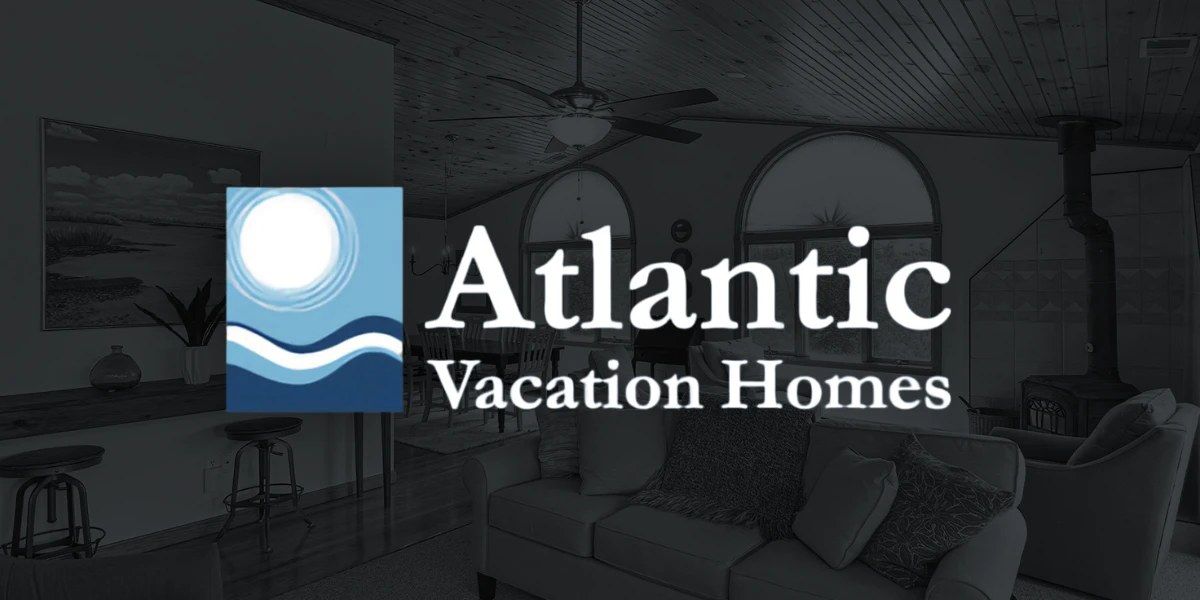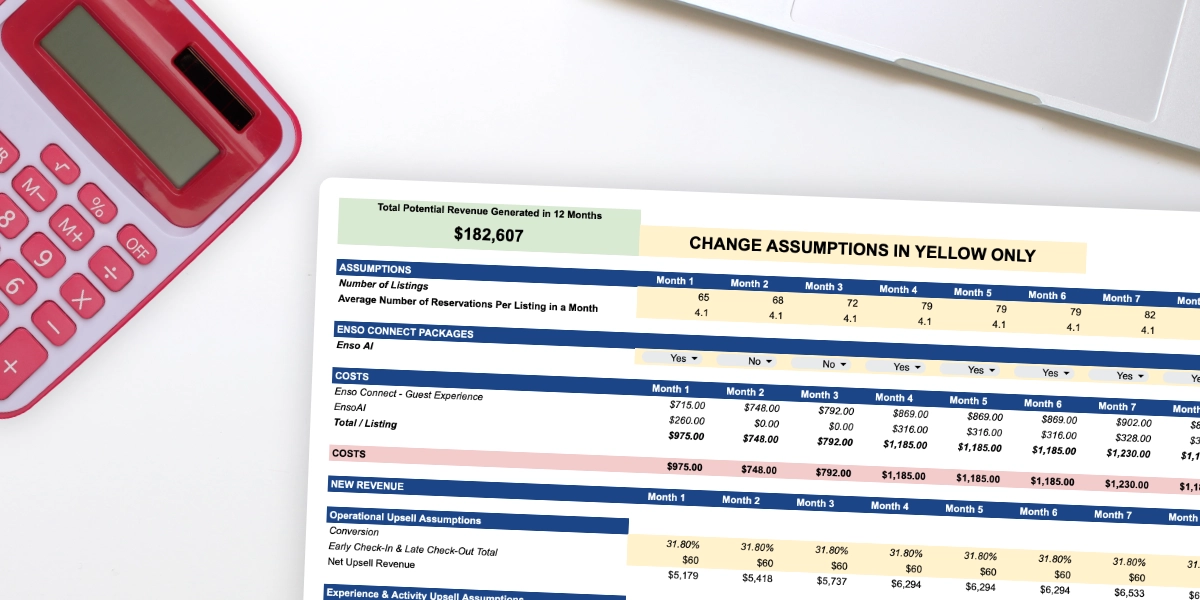Updated: June 11, 2025
As Airbnb property owners, you’ve put your heart and soul into making it a welcoming space. But there’s a constant worry now that Airbnb doesn’t initially charge for security deposits – what if guests cause damage? Is it possible to set damage deposits for Airbnb guests?
Previously, Airbnb’s damage deposit pre-authorization offered some peace of mind. But now, hosts must navigate the process of the Airbnb Resolution Centre to receive costs for damages, which involves proving every receipt and providing photos of the damage.
However, there is an exception. Hosts who manage their listings with API-connected software, such as Enso Connect, can set a security deposit or require a damage waiver using Airbnb’s offline fees feature, offering a more streamlined and controlled approach to managing property protection.
In this how-to guide, learn how to navigate the world of short-term vacation rental security fees and waivers, what to do when a situation arises with Airbnb guests, and tools and technology to make this process as simple as possible and more efficient for vacation rental property management.
How to Setup Damage Deposits and Waivers for Your Airbnb Guests
If you’re here, we figure you own Airbnb property(s) where managing damage and security risks is a constant worry. With Airbnb’s current policy, hosts no longer have the convenience of pre-approved damage protection. Instead, they must face the daunting process of going through the resolution centre at Airbnb to recover costs from Aircover. This can be frustrating and time-consuming.
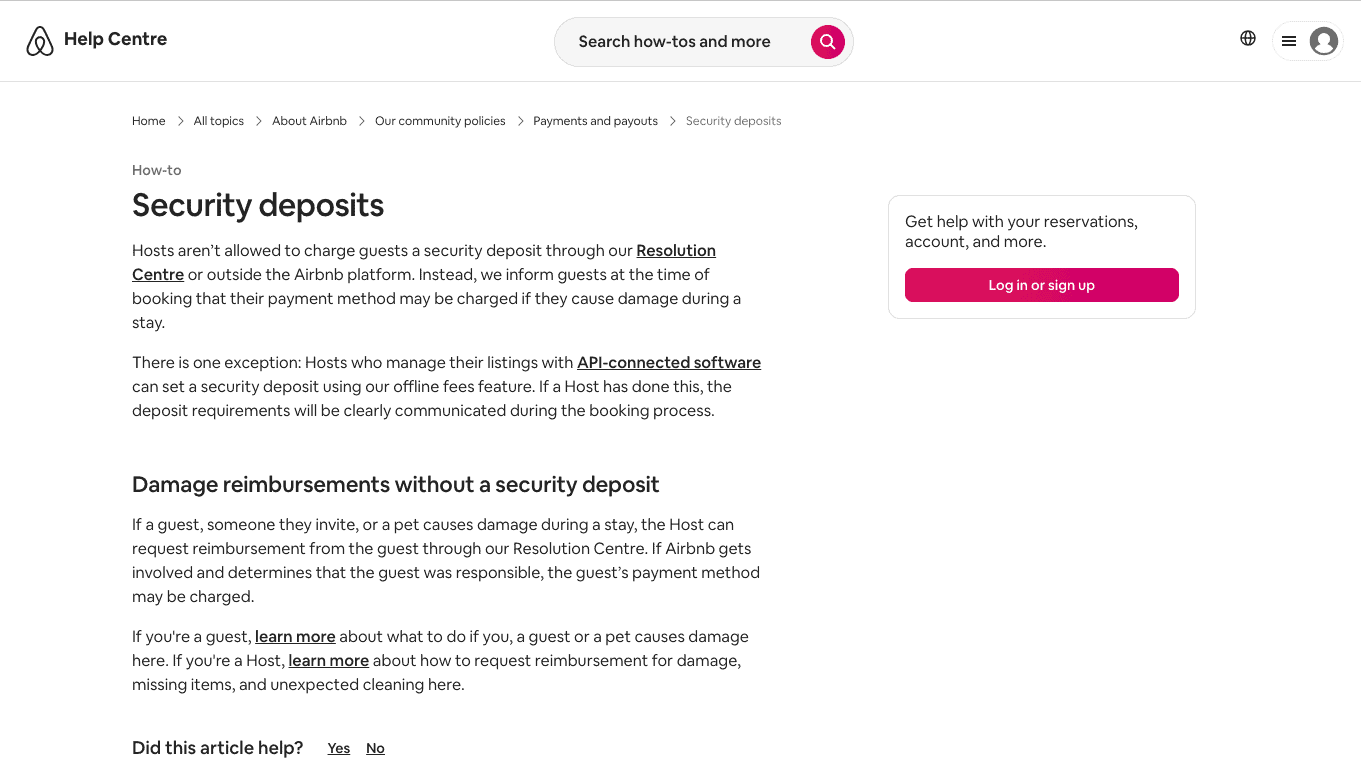
Airbnb article from December 2023

Airbnb article from June 2025
Airbnb’s Policy on Security Deposits
Airbnb’s current approach to security deposits has evolved, creating limitations and challenges for hosts. As per their current approach, hosts are no longer permitted to charge guests a security deposit directly through the resolution centre or outside the platform. Instead, Airbnb notifies guests at booking about potential charges for damages. This policy restricts hosts’ ability to secure deposits upfront, shifting the focus to post-stay damage claims.
These guidelines, detailed in Airbnb’s help article, underscore the challenges that hosts face in efficiently managing damage protection without direct control over security deposits.
However, hosts managing their listings with API-connected software like Enso Connect, can set and collect a security deposit or other relevant fees using Airbnb’s offline fees feature.
”“Most hosts are not allowed to charge security deposits, either through our Resolution Center or outside the Airbnb platform. To address damage or accidents that happen during a stay, Airbnb offers top-to-bottom protection through AirCover for Hosts.”
Quote from Airbnb Help Article: ‘How-to: Security deposits’
What is API-Connected Software?
API-connected software is like a bridge between Airbnb’s platform and external property management tools. These applications integrate directly with platforms like Airbnb through an Application Programming Interface (API). These tools offer more control and flexibility for hosts.
This technology is important for property managers and hosts as it allows them to extend and customize the functionality of Airbnb. For instance, such software can enable hosts to set security fees and manage bookings more efficiently.
Here is the list of Airbnb software partners.
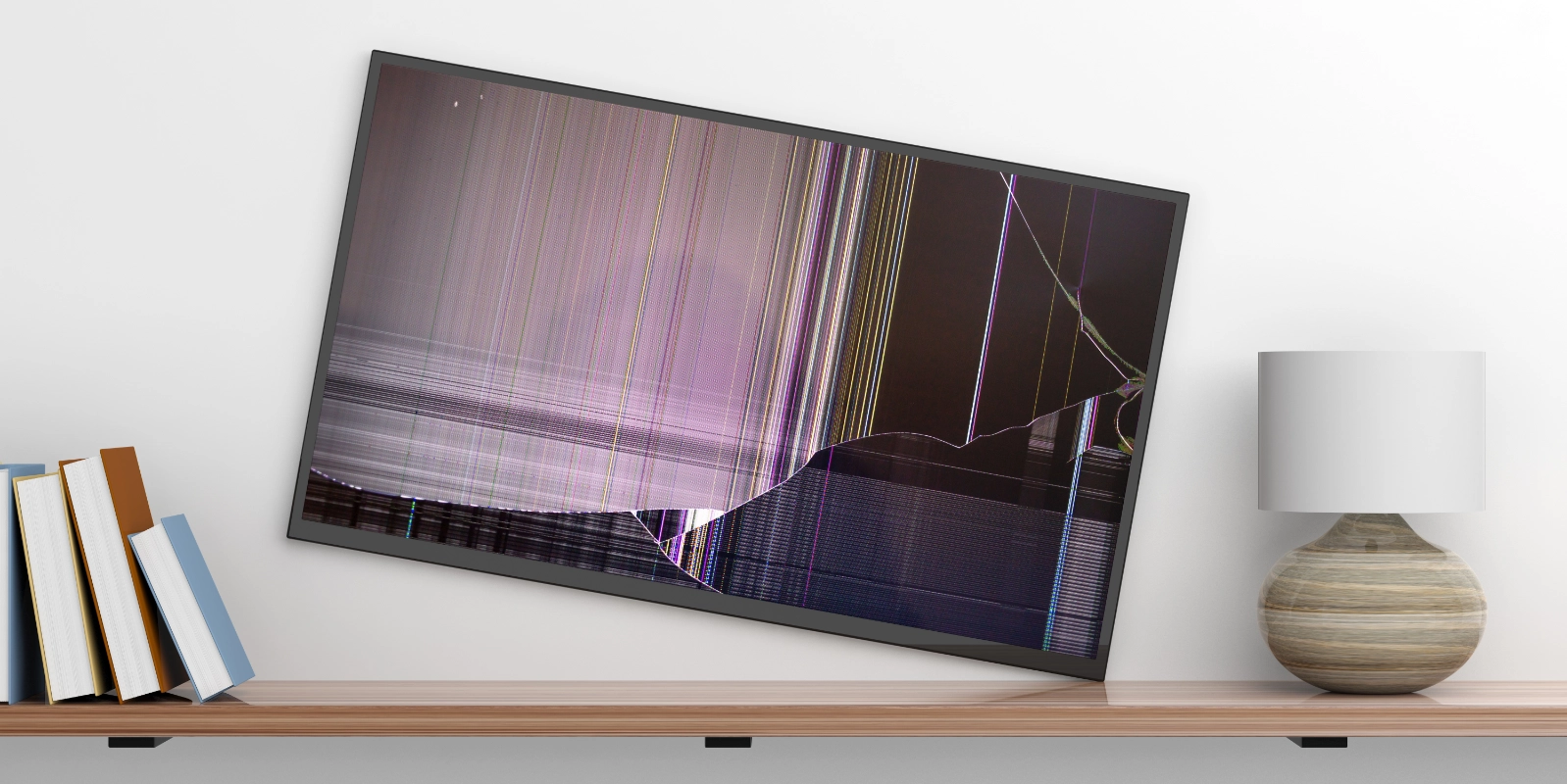
Why Hosts Should Set Up Damage Deposits and Waivers for Airbnb Guests
Every Airbnb host should consider damage deposits and waivers. With these measures in place, hosting becomes a more secure and enjoyable experience.
Property Safety
These measures ensure you’re not financially burdened if guests accidentally or intentionally damage your property.
Reduced Hosting Stress
Knowing your investment is protected reduces the worry that comes with hosting, allowing you to enjoy the experience more.
Trust and Transparency
When guests are aware of these policies upfront, it fosters a sense of responsibility and care for your property.
Maintain Rental Quality
Fees collected can be reinvested in maintaining and upgrading your rental, keeping it attractive and competitive in the market.
Effortless Management with API-Connected Systems
Enso Connect makes it easy to set up and manage guest protection tools. Automate offering guests a choice between security deposits or damage waivers. The unified inbox streamlines communication with guests, while the Boarding Pass guest app makes the process seamless for them.
Important note: To stay compliant with Airbnb policy, be sure to clearly communicate these options in advance and keep them optional.
Understanding Damage Waivers and Safety Deposits
When managing vacation rental properties, understanding damage waivers and safety deposits is important for securing your assets. You choose the protection tools that best suit your property management style and needs. Our recommendation is to provide guests with a choice between refundable security deposits and non-refundable and much smaller damage fees. Most people (about 70%) choose damage waivers.
Damage Waiver
Damage waivers are non-refundable fees that guests pay upfront, typically added to the booking cost. This fee covers potential minor damages during their stay.
Benefits
- Ease of Management
Since they are non-refundable, there’s no need for hosts to assess damages or manage refunds, simplifying the administrative process. - Immediate Funds for Repairs
Hosts have immediate access to funds to address minor damages, without the need for detailed claims or assessments. - Potential Revenue Stream
This protection tool, when properly managed and communicated, can be a source of significant revenue for hospitality operators. Read how a European short-term rental operator saw immediate revenue growth after adding damage waivers to their business.
Considerations
- Limited Coverage
Damage waivers typically cover only minor incidents, leaving hosts potentially vulnerable to more substantial damages. - Guest Behavior
Knowing a waiver is paid, guests might not be as cautious, potentially leading to more wear and tear.We studied how pros implement protection tools and outlined best practices to reduce friction and boost results with damage waivers.
Safety Deposit
The safety deposit is a refundable amount held or charged on the guest’s payment method, used only if there are damages during their stay.
Benefits
- Direct Damage Accountability
They provide a direct financial incentive for guests to take care of the property, as they stand to lose this deposit in case of any damages. - Coverage for Significant Damages
Safety deposits can be set at a higher value, offering better protection against serious damages.
Considerations
- Administrative Workload
Requires more effort from the host in terms of assessing damages post-stay and processing claims. - Potential Guest Disputes
There’s a higher likelihood of disputes over deductions, which can affect guest relations and potentially lead to negative reviews.
Watch to learn how to simply set up a damage waiver or deposit using Enso Connect
Common Challenges Airbnb Hosts Face in Damage Deposits and Waivers
Airbnb hosts often face several challenges when implementing protection tools in their properties. This requires careful planning, clear communication, and the right technological tools to ensure both host security and guest satisfaction.
Finding the Right Fee Amount
It’s challenging to decide how much to charge without deterring guests, while still covering potential damages adequately.
Pro Tip:
For damage waivers, we recommend charging 20–25% of a typical security deposit. This non-refundable fee offers guests peace of mind—and most are willing to pay it.
Clear Guest Communication
Hosts need to convey these policies to guests, ensuring they understand and agree to the terms – before booking.
Adhering to Policies and Laws
Aligning deposit and waiver strategies with both Airbnb’s guidelines and local authorities can be complex.
Pro Tip:
Stay updated on Airbnb policy updates and your local regulations.
Resolving Disputes
Disagreements over damages and deposit deductions require tactful, fair resolution strategies.
Pro Tip:
Offering a damage waiver option, you prevent these disputes.
Prompt Deposit Refunds
Ensuring deposits are refunded quickly and accurately to maintain good relations with guests.
Pro Tip:
With damage waivers there is no need to refund this small non-refundable fee.
Technical Setup
Properly setting up and using API-connected software can be technically demanding.
Balancing Security and Hospitality
Implementing security deposits and waivers while maintaining a welcoming and positive guest environment.
Pro Tip:
Communication is key. First, be transparent—present protection tools before booking to avoid any surprises.
Second, highlight the benefits of a damage waiver: no large deposit, no refund delays, and less stress over accidents.

Customization and Revenue in Vacation Rental Management
To increase your earnings and provide a better experience for guests in vacation rentals, you can customize fees, like damage waivers and additional charges.
Smart Damage Waiver Pricing
Picture this: As a host of a charming downtown apartment popular among weekend city explorers, you implement a smart damage waiver policy, setting it at 20% of the safety deposit. This percentage strikes the right balance – it’s enough to cover potential minor damages without burdening your guests financially. This strategic pricing protects your investment and maintains your rental’s appeal in a competitive urban market.
Set damage waivers based on a calculated percentage of the rental cost or in line with the property’s market value to maximize returns. Enso Connect suggests setting the damage waiver at 20-25% of the safety deposit. This approach ensures adequate coverage for potential damages while maintaining guest affordability.
Pet Fees
Picture this: You’re hosting a cozy cabin in the mountains. A family with a small dog wants to book a weekend stay. You’ve set up a damage waiver to cover potential minor incidents and added a small pet fee to accommodate the extra cleaning required. The family is happy to pay this fee for their furry friend, seeing the value in your transparent and tailored approach.
Implement pet fees to address the extra cleaning and maintenance furry friends may bring. These can be structured per pet or as a flat rate. Allowing pets on the premises helps balance extra income and welcomes pet owners.
3 Ways to Boost Revenue and the Guest Experience
Airbnb hosts can boost their revenue and offer great guest experiences by thoughtfully applying these protection tools. However, transparent and upfront notice of these fees should be provided.
- Be Transparent About Fees
Rental hosts should ensure that all fees are communicated transparently in your listing. This helps build trust and reduces last-minute surprises for guests. - Offer Value-Added Services
Fees should correspond to tangible benefits, enhancing the guest’s stay and perceived value.
- Remove Friction with Technology
Make the process seamless and convenient for guests. Share information proactively and provide clear instructions. Offer choice and instant payment. The best approach: integrate protection tools into your verification flow, using a single link, like the Boarding Pass guest app.
”“You should put a Security Deposit on your listing, even if it is just a couple of hundred dollars. Airbnb does not charge the guests the Security Deposit when booking so there is really no reason not to have one.
But, should a guest causes damage and you want to file a claim against your security deposit, this is the procedure:
https://www.airbnb.com/help/article/264/what-do-i-do-if-my-guest-breaks-something-in-my-place
For best results, always provide a picture of the damage as well as the cost to replace or repaid. If you have the original receipt for the item, that helps as well.”
Advice about damage protection from Level 10 Airbnb Host in Airbnb Community Forum
Best Practices for Communicating Damage Policies to Guests
Clear communication is key when setting up damage deposits and waivers. Follow these steps to help in building trust with your guests, leading to a smoother stay for everyone. Here’s how you can do it effectively:
Be Clear and Concise: Explain your damage policies simply. Make sure guests understand what they’re agreeing to.
Timing Matters: Share these details early – before or during booking.
Talk Benefits: Keep the tone light and friendly to makes guests feel more at ease. Present the benefits of the protection tools for their peace of mind and joyful stay.

Align Deposit and Waivers with Airbnb Guidelines
For Airbnb hosts, it’s important to align your deposit and waiver strategies with Airbnb’s software policies and local regulations. Follow these steps to help create a balanced and legally compliant approach to managing security deposits and damage waivers.
Understand Airbnb’s Current Guidelines
Familiarize yourself with Airbnb’s policies on damage deposits and waivers. Regularly check their guidelines for any updates.
Comply with Local Laws
Research and adhere to local regulations related to rental properties and security deposits in your area.
Clear Policy Communication
Make sure your Airbnb listing transparently outlines your deposit and waiver policies, meeting Airbnb’s standards for guest communication.
Consistent Policy Enforcement
Apply your deposit and waiver rules uniformly across all reservations to ensure fairness and avoid discrimination.
Adapt to Changes
Stay updated on changes in both Airbnb’s policies and local laws. Modify your strategies accordingly to maintain compliance.
Find Local Short Term Rental Regulations in Your Area
To research and adhere to local regulations related to rental properties and security deposits, you can:
- Check Local Government Websites: Visit the official websites of your city or county government. They often have sections dedicated to housing or rental regulations.
- Consult Legal Professionals: Seek advice from a lawyer who specializes in real estate or rental laws in your area.
- Contact Local Housing Authorities: These organizations can provide information about rental regulations, including security deposits.
- Join Local Landlord or Property Management Associations: These groups are usually well-informed about local laws and changes in regulations.

Handle Airbnb Disputes and Claims Effectively
When a guest damages your property, it can be stressful. But don’t worry, there’s a way to handle it calmly and effectively.
Here are some simple steps to manage these situations:
- Document Everything: Take clear photos of any damages immediately.
- Communicate Clearly: Have a straightforward and calm conversation with your guests about what happened.
- Follow Airbnb’s Guidelines: Use Airbnb’s process for filing a claim, ensuring fairness and clarity.
- Stay Professional: Always keep your communication polite and professional.
This approach helps you tackle disputes with ease, keeping your hosting experience positive.
Manage Refunds for Airbnb Security Fees
For Airbnb hosts, managing refunds for damage deposits and waivers involves a meticulous process. By implementing these steps, hosts of Airbnb vacation rental properties can manage refunds effectively.
Conduct Immediate Property Inspection
As soon as your guest checks out, inspect the property thoroughly. This helps ensure any potential damages are identified promptly.
Determine Refund Amount
Assess whether the property is left in good condition. If no damage is found, proceed to refund the full security deposit amount.
Swift Processing of Refunds
Use Airbnb’s platform or API-connected software like Enso Connect to efficiently process refunds. This helps in maintaining a smooth workflow.
Communicate with Guests
Keep an open line of communication with your guests regarding the refund process. Inform them promptly if there are no issues or if deductions are necessary due to damage.
Document Everything
Maintain detailed records of the property’s condition pre- and post-stay, alongside all communications regarding deposit deductions. This documentation is essential for resolving any disputes and providing evidence to Airbnb and the guest if required.
How to Connect and Use API-connected Software
For Airbnb hosts looking to streamline managing damage protection, you will need to set up API-connected software that provides damage deposits and waivers for your vacation rental.
Choose an API-Connected Software
Select software that has an application programming interface like Enso Connect that integrates with Airbnb and supports damage deposits and waivers.
Integrate with Airbnb
Connect your chosen software to your Airbnb account. This usually involves authorizing the software to access and manage your Airbnb information.
Configure Damage Protection Settings
Within the software, set up your preferences for damage deposits and waivers. You can define the amounts, conditions, and whether you want to offer a damage waiver, a safety deposit, or both.
Communicate with Guests
Ensure that the details about the fees are communicated to guests during the booking process. This is usually handled by the software but check to ensure clarity and the guest knows.
Manage Deposits and Waivers
Monitor and manage waivers and fees through the software’s dashboard. This includes holding, charging, or refunding deposits and handling waiver fees.
Stay Updated
Keep an eye out for any changes in Airbnb’s policies or the software’s features for continued compliance and efficiency.
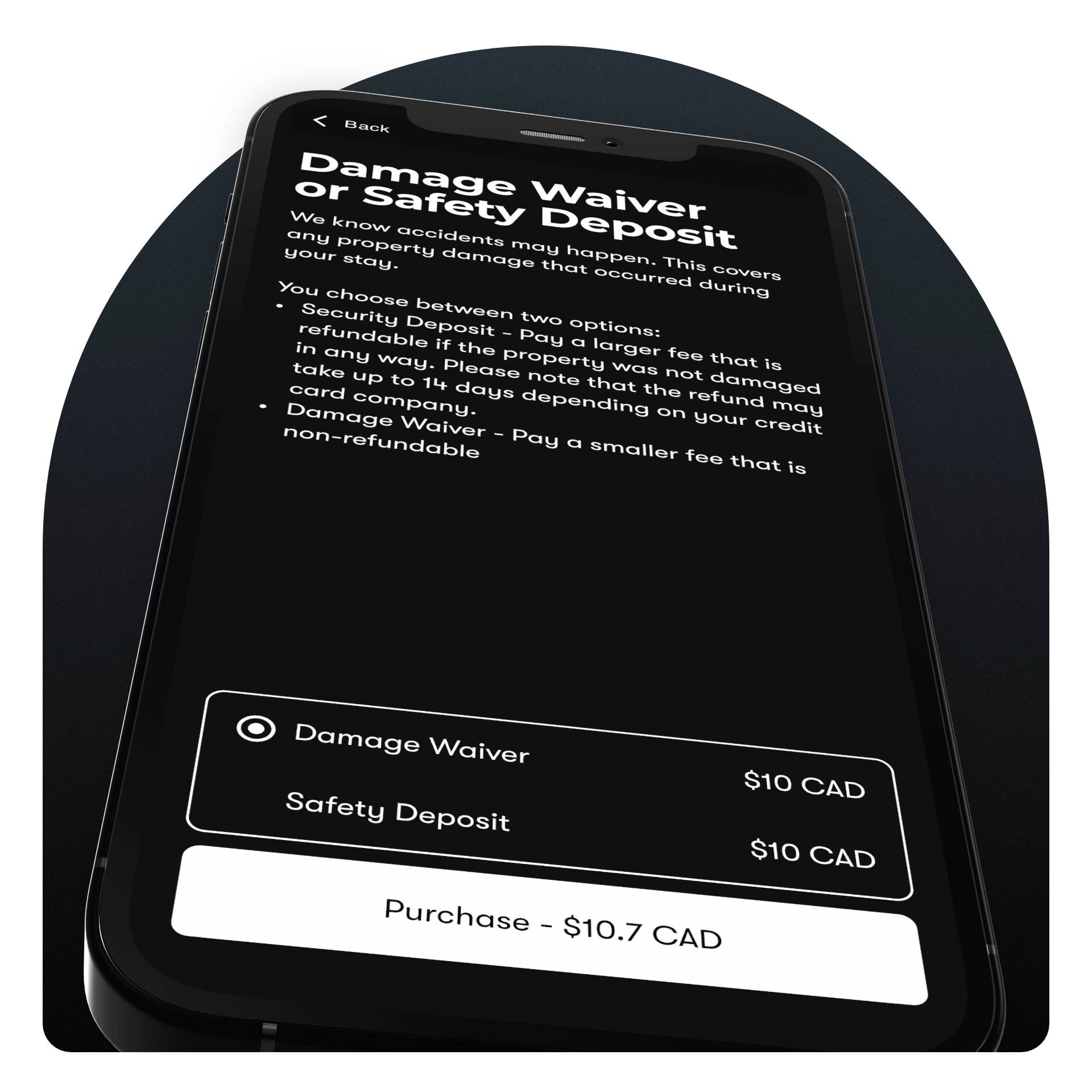
Navigating Airbnb Damages with Enso Connect
Managing damages and securing deposits are critical aspects of Airbnb hosting. Enso Connect, with its API-connected capabilities, simplifies this process.
Seamless Airbnb Integration
Enso Connect’s integration with Airbnb simplifies managing security deposits and waivers. Enso Connect’s smart conditions allow you to customize protection tools for different channels, applying different rules for Airbnb and direct bookings.
Note: it’s important to remember that partnership with Enso Connect does not automatically guarantee compliance on your behalf. Hosts are still responsible for understanding and following Airbnb’s policies – including how fees, guest information, and communication are handled. We’re here to support you with tools that make compliance easier, but it’s crucial to stay informed and ensure your practices align with Airbnb’s expectations.
Choice and Flexibility for Guests
Hosts can opt for safety deposits, held on guest cards, or implement non-refundable damage waivers. This flexibility allows for tailored protection strategies, suitable for different property types.
Custom Fee Configuration
The platform enables hosts to impose pet fees, resort fees, or local taxes, and even create unique fees for specific amenities. This feature helps in catering to local regulations and adding personalized touches to guest stays.
Streamlined Payments
Hosts can set a variety of custom fees for specific amenities or seasonal offerings. Combined with Stripe’s payment processing, this feature simplifies financial transactions, providing a significant edge, especially considering Airbnb’s focus on guest satisfaction.
More Revenue with Upselling and Experiential Add-ons
The platform supports the creation of new revenue streams through personalized upsells, offering guests additional services and experiences.
Advanced Analytics and Custom Workflows
The Guest Journey Editor, along with AI tools, provides insights and automates workflows, ensuring a smooth operational process.
The Importance of Security Deposits for Airbnb Guests
In today’s Airbnb market, setting up your own security deposits and waivers has become more critical than ever. Since Airbnb no longer offers pre-authorized damage deposits, hosts must find alternative ways to protect their properties.
Using a platform like Enso Connect allows hosts to efficiently manage these deposits and waivers. This ensures better protection for your property and a smoother experience for your guests. It gives hosts control over damage protection and peace of mind, which is crucial for a successful hosting experience.
In the growing world of vacation rentals, adopting these modern methods is a key step towards success and standing out from the competition.
Frequently Asked Questions
What is the difference between a damage waiver and a safety deposit?
A damage waiver is a non-refundable fee guests pay to cover potential minor damages during their stay. It’s generally used for minor incidents. A safety deposit is a refundable amount held from the guest’s payment method, used only if there is actual damage. It’s more suited for covering significant damages.
How much should be charged for a damage waiver or set as a security deposit?
The amount for a damage waiver should be a reasonable percentage of the potential costs of minor damages. Enso Connect typically suggests the amount to be about 20-25% of the safety deposit amount. This provides adequate coverage while being fair to guests.
What's the best way to inform guests about security fees and policies?
Clearly outline your damage deposit policies in your Airbnb listing description. It has to be done before booking for transparency and complying with Airbnb requirements. After a guest books, send a friendly reminder message explaining the policy details again. This ensures guests are well-informed from the start.
How should hosts manage the refund process for security deposits?
After your guest checks out, quickly inspect the property. If there’s no damage, process the refund as soon as possible. Use a consistent, transparent method for all guests to ensure fairness and avoid confusion.
Can guests choose between a damage waiver and a safety deposit on Enso Connect?
Yes, guests using Enso Connect have the flexibility to choose between a damage waiver and a safety deposit. This choice allows guests to choose the option that best suits their preferences and financial comfort.
What are the advantages of using API-connected software for damage protection?
For hosts, the benefits of an API-connected system offer a streamlined approach to managing property protection. It can potentially increase revenue through damage waivers. For guests, it provides clear choices and enhances their booking experience with transparency and flexibility.
How can hosts balance the need for security with maintaining a positive guest experience?
Set clear, fair damage policies that don’t feel too restrictive to guests. Communicate these policies in a friendly manner. Use a system like Enso Connect to manage security aspects efficiently and unobtrusively, ensuring guests feel both welcome and responsible.
How Enso Connect Can Help
Using Enso Connect for managing damage deposits and waivers offers a modern, efficient solution for Airbnb hosts. It aligns with guest preferences, enhances their experience, and opens up additional revenue streams for hosts.
For a hands-on experience of how Enso Connect can streamline property management and complement the guest journey, consider booking a demo.
Discover how you can transform your vacation rental business.
Discover the power of Enso Connect’s innovative software solutions and unlock the full revenue potential of your vacation rental today!


